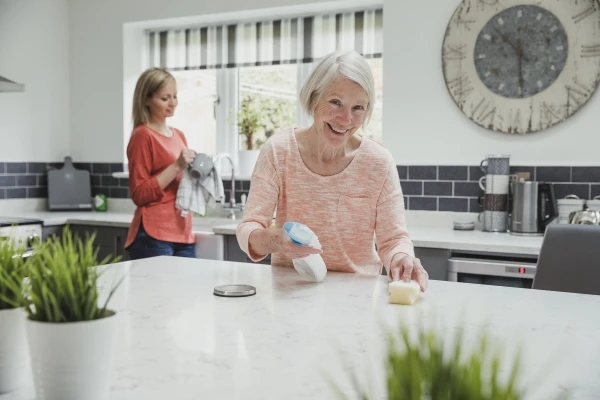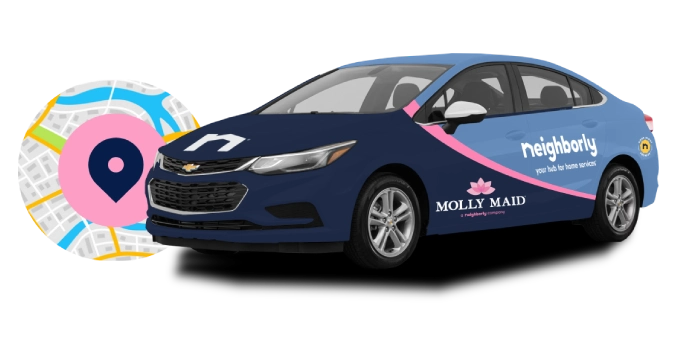
One of the most difficult parts of getting older is maintaining a clean, safe home. If you have parents, elderly friends or family members who live independently you may have noticed that they are not as active as they used to be. You may have also noticed that they are struggling a little more to keep their home as clean and neat as it used to be.
If you’ve been spending time cleaning for an elderly family member, friend or loved one in your life, and are looking for ways to help them stay self-sufficient, we have some advice to help you be more efficient and, at the same time, reduce some of the unique risks that seniors face.
House Cleaning for Seniors
First, have an honest discussion about which household chores they feel confident doing on their own. Although many seniors can complete common cleaning tasks on their own, they should only take on ones that they feel physically and mentally able to complete (this is where an honest assessment is necessary). Sweeping may be easier than vacuuming, which requires exerting a little more energy. Moving around a heavy vacuum may be too taxing for some older adults, so understanding limitations is important when determining what can and can’t be done.
Every year, 3 million seniors in the United States are treated for injuries from falls. That risk can be reduced by leaving cleaning tasks that are too awkward or difficult to others — including, perhaps, a professional home cleaning provider.
Cleaning Tips for Seniors: How to Help Set Them Up
Make a Checklist. Create a cleaning checklist that covers all the basic household chores. Try to include a few day-to-day chores, weekly chores, as well as noting some deep cleaning tasks that might require a few helping hands. Caregivers can help shape the list and determine which tasks the senior can tackle, and which tasks may require the help of others.
Organize Your Cleaning Supplies. Keep all cleaning supplies in a safe, accessible spot. If you live in a multistory home, consider having a second stash of cleaning supplies stored upstairs to avoid carrying heavy or awkward cleaning supplies and tools up and down the stairs. In many cases, transporting a heavy vacuum or mop should be done by a care provider.
Always Make a Note. Seniors can stay safe by holding off on certain tasks until help is available. When cleaning, record additional to-do’s that may be too difficult to accomplish alone. Things like moving heavy furniture and rugs to sweep and/or vacuum or taking out heavy trash bags should be added to the list of ‘ask for help’ cleaning items.
How to Help Seniors Clean
It can be a challenge to help a loved one tackle household cleaning tasks. Whether you’re a friend or family member, try to remember that needing, or asking for this kind of help can also be difficult for your loved one. They may be frustrated, embarrassed, or ashamed to ask for help to accomplish things they’ve done without a second thought their entire lives.
To manage your time helping an elderly person clean, prioritize your tasks around the following tips:
Safety First
Identify tasks that are above and beyond the physical capabilities of a senior. Based on what you know about their health, you may wish to tackle tasks for them that require heavy lifting, bending, or twisting.
Some examples include:
- Taking out the trash
- Vacuuming
- Taking heavier items up or down stairs
- Moving furniture to clean
- Scrubbing floors
- Cleaning the bathtub
- Cleaning the toilet
Eliminate Dangerous Clutter
Some seniors can accumulate a lot of treasured items during their lives, but those items can also pile up, creating a potential hazard. To reduce the risk of falls, eliminate clutter as much as possible. Encouraging seniors to donate items they no longer need is a great way to cut down the amount of clutter around the home. It will also make cleaning a little easier too!
Everything in Its Place
Work with your loved one to establish an easily accessible location to place everything they may need throughout the day. This will reduce clutter and help them feel and stay more organized. These items may include cell phones and chargers, coats, shoes, medicine, even car keys. Regardless of age, we all forget things from time to time. Placing items we need and use every day in a common area can help minimize the frustration of misplaced items and keep things better organized.
Help Them Make a Habit of Keeping High-Traffic Areas Clean
For seniors who may avoid going up or down stairs, there’s a tendency to leave items that need to go to the next level of the home at the bottom or top of the stairs, or even on the stairs themselves. This creates a tripping hazard that should be addressed as soon as possible. Instead, help them designate another place to temporarily store these items, preferably on a table or shelf, until help is available.
Do More Than Just Clean
A visit to an elderly loved one or friend can certainly be more than just a cleaning session. Don’t forget to take a few breaks and try to connect. While this might take a little more time out of your day, the social interactions just might be the highlight of your senior’s week. In the end, you’ll both feel a lot better about the support you’re providing and the time you're spending together.
While you’re there, check on these items too:
Smoke Detectors. Check any smoke and carbon monoxide detectors to make sure they are in good working order. Can your loved one hear them when they go off? Ask if any such devices have made any noises that might indicate a low battery or malfunction. Schedule an appointment with a local HVAC professional to ensure the home is heating and cooling properly and to perform any necessary maintenance (like checking detectors and thermostats).
Food Expiration. At one time or another, we have all shifted food to the back of our fridge, then reached for it without realizing it has expired. Take some time to clear out any old food, or expired food to reduce the risk of your loved one mistakenly eating bad food. This can be especially challenging for seniors with limited or poor eyesight.
Medicine Check. If your loved one takes vitamins and/or medications and could use your help getting their doses and frequency correct, consider helping with a system that works for them. A pill organizer is a great item to help them stay on track. Adding an alarm to their phone, or some well-placed notes around the house can also serve as a reminder to take a specific medication.
Emergency Kit. In addition to a fully stocked first aid kit, you should help make a plan for any emergency situations. Falls are a particular problem for the elderly so encourage seniors to keep their cellphones charged and on their person. Discuss and review other methods that might work for them to contact someone in the event of a fall or accident.
Related Topic: 5 Tips for Hall Closet Organization
Call in the Pros
Aging is a natural and unavoidable process, but it doesn’t mean giving up everything you used to do. With help, seniors can age in their homes longer and with less risk and more confidence. If you’re helping an elderly family member or friend around their home, you may find that you need help keeping up with it all. Whether you need help cleaning your home, their home, or both the professionals at your local Molly Maid are ready to assist you. We offer daily, weekly, monthly, or appointment cleaning services that can help you get it all done. To learn more, request an estimate online today.
